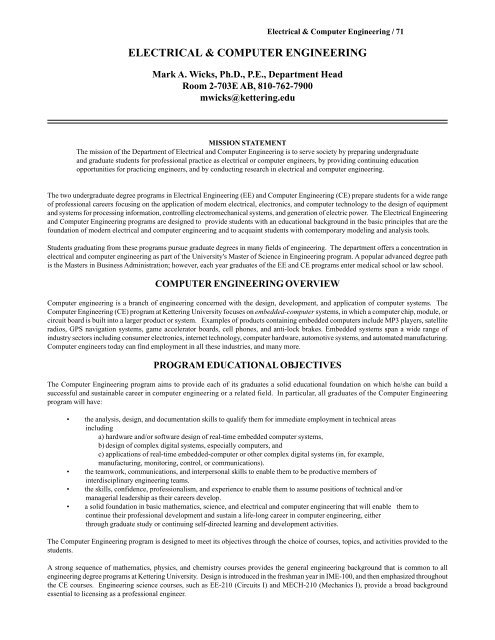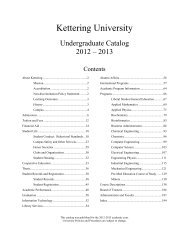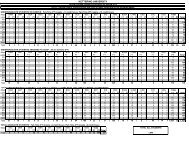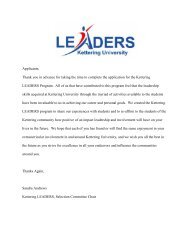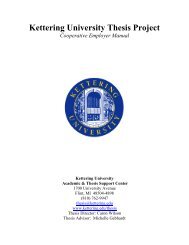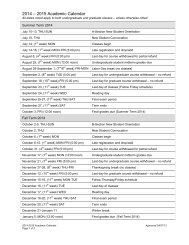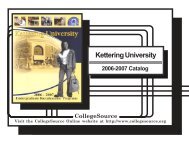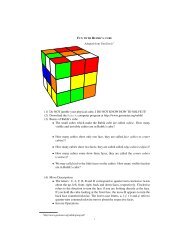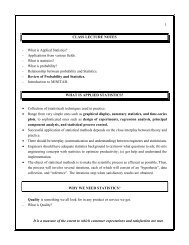2007-2008 Undergraduate Catalog - Kettering University
2007-2008 Undergraduate Catalog - Kettering University
2007-2008 Undergraduate Catalog - Kettering University
Create successful ePaper yourself
Turn your PDF publications into a flip-book with our unique Google optimized e-Paper software.
Electrical & Computer Engineering / 71<br />
ELECTRICAL & COMPUTER ENGINEERING<br />
Mark A. Wicks, Ph.D., P.E., Department Head<br />
Room 2-703E AB, 810-762-7900<br />
mwicks@kettering.edu<br />
MISSION STATEMENT<br />
The mission of the Department of Electrical and Computer Engineering is to serve society by preparing undergraduate<br />
and graduate students for professional practice as electrical or computer engineers, by providing continuing education<br />
opportunities for practicing engineers, and by conducting research in electrical and computer engineering.<br />
The two undergraduate degree programs in Electrical Engineering (EE) and Computer Engineering (CE) prepare students for a wide range<br />
of professional careers focusing on the application of modern electrical, electronics, and computer technology to the design of equipment<br />
and systems for processing information, controlling electromechanical systems, and generation of electric power. The Electrical Engineering<br />
and Computer Engineering programs are designed to provide students with an educational background in the basic principles that are the<br />
foundation of modern electrical and computer engineering and to acquaint students with contemporary modeling and analysis tools.<br />
Students graduating from these programs pursue graduate degrees in many fields of engineering. The department offers a concentration in<br />
electrical and computer engineering as part of the <strong>University</strong>'s Master of Science in Engineering program. A popular advanced degree path<br />
is the Masters in Business Administration; however, each year graduates of the EE and CE programs enter medical school or law school.<br />
COMPUTER ENGINEERING OVERVIEW<br />
Computer engineering is a branch of engineering concerned with the design, development, and application of computer systems. The<br />
Computer Engineering (CE) program at <strong>Kettering</strong> <strong>University</strong> focuses on embedded-computer systems, in which a computer chip, module, or<br />
circuit board is built into a larger product or system. Examples of products containing embedded computers include MP3 players, satellite<br />
radios, GPS navigation systems, game accelerator boards, cell phones, and anti-lock brakes. Embedded systems span a wide range of<br />
industry sectors including consumer electronics, internet technology, computer hardware, automotive systems, and automated manufacturing.<br />
Computer engineers today can find employment in all these industries, and many more.<br />
PROGRAM EDUCATIONAL OBJECTIVES<br />
The Computer Engineering program aims to provide each of its graduates a solid educational foundation on which he/she can build a<br />
successful and sustainable career in computer engineering or a related field. In particular, all graduates of the Computer Engineering<br />
program will have:<br />
• the analysis, design, and documentation skills to qualify them for immediate employment in technical areas<br />
including<br />
a) hardware and/or software design of real-time embedded computer systems,<br />
b) design of complex digital systems, especially computers, and<br />
c) applications of real-time embedded-computer or other complex digital systems (in, for example,<br />
manufacturing, monitoring, control, or communications).<br />
• the teamwork, communications, and interpersonal skills to enable them to be productive members of<br />
interdisciplinary engineering teams.<br />
• the skills, confidence, professionalism, and experience to enable them to assume positions of technical and/or<br />
managerial leadership as their careers develop.<br />
• a solid foundation in basic mathematics, science, and electrical and computer engineering that will enable them to<br />
continue their professional development and sustain a life-long career in computer engineering, either<br />
through graduate study or continuing self-directed learning and development activities.<br />
The Computer Engineering program is designed to meet its objectives through the choice of courses, topics, and activities provided to the<br />
students.<br />
A strong sequence of mathematics, physics, and chemistry courses provides the general engineering background that is common to all<br />
engineering degree programs at <strong>Kettering</strong> <strong>University</strong>. Design is introduced in the freshman year in IME-100, and then emphasized throughout<br />
the CE courses. Engineering science courses, such as EE-210 (Circuits I) and MECH-210 (Mechanics I), provide a broad background<br />
essential to licensing as a professional engineer.


